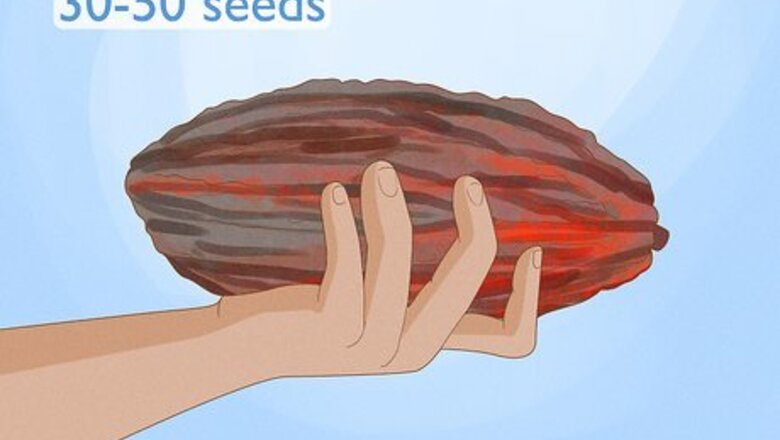
views
Germinating Cacao Seeds
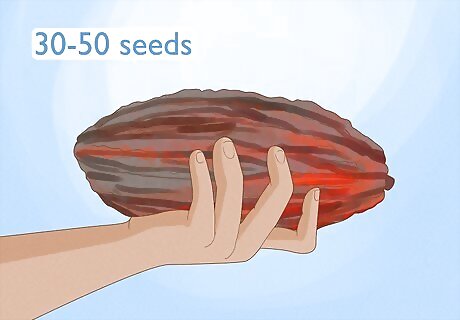
Purchase a cacao pod to grow your tree from seed. Cacao pods can often be obtained from a farmer’s market or fellow gardener in tropical climates. Otherwise, you’ll likely need to buy your starter pod through an online retailer. Be prepared to pay for expedited shipping, as cacao seeds will only germinate when they’re fresh. Familiarize yourself with your country’s import laws if you're ordering a pod from overseas. Most reputable sellers will typically inform you of potential issues before you buy. Each pod holds up to 30-50 seeds, giving you plenty of chances to get a new plant growing successfully. If you'd prefer the ease of growing a chocolate tree from a viable seedling, you can order a young plant from an exotic plant nursery or special horticulturist and skip straight to the planting process once it arrives.
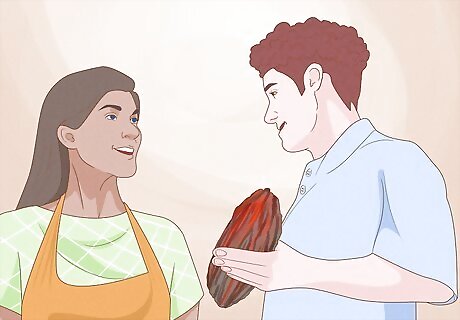
Find out more about the specific type of plant you’ll be growing. Since you won’t be able to be so hands-on during the growing process, it’s a good idea to ask your supplier lots of questions. A knowledgeable cacao farmer or vendor will be able to tell you which plants bear the most fruit in a given set of conditions. Find out the average amount of time it takes for a mature plant to begin producing its own pods. Depending on the variety, it can take anywhere from 2 to 5 years to reach fruiting size.
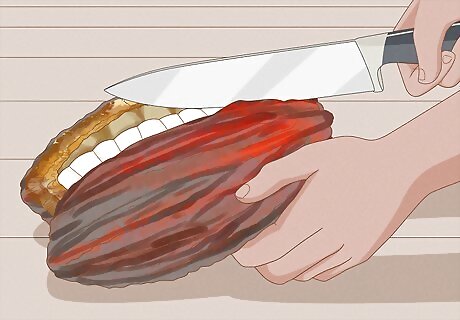
Harvest the seeds from the ripe pod. Use a sharp knife to dissect the pod, being careful not to damage the soft seeds inside. Pluck the seeds from the fleshy white pulp by hand, then rinse them under a stream of lukewarm water to remove any remaining residue. If you’d prefer, you can also put the seeds in your mouth and suck them clean instead. The pulp inside a cacao pod is a sweet, sticky nectar which can be very enjoyable on its own. Eat or discard whatever seeds you don’t plan on planting. They spoil quickly once the pod is open and can’t be stored effectively, so there’s no sense in keeping them.
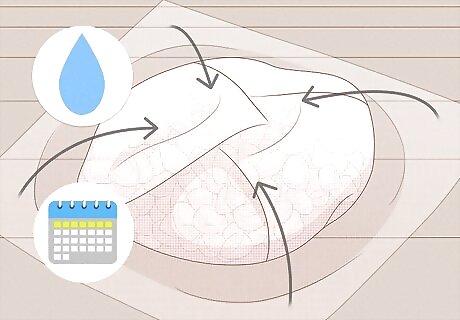
Keep cacao seeds moist and warm to kickstart the germination process. The best way to do this to wrap the seeds in damp paper towel and leave them sitting on a hot water bottle or heated seedling mat until they sprout. This may take anywhere from 3-7 days, depending the exact levels of heat and humidity present. You can make your own DIY hot water bottle by soaking a hand towel in hot water and sealing it inside a gallon-sized plastic zipper bag. This will only serve as a temporary replacement since it will only stay hot for 1 hour. Cacao seeds must be germinated before they can be planted.
Planting Cacao Seedlings
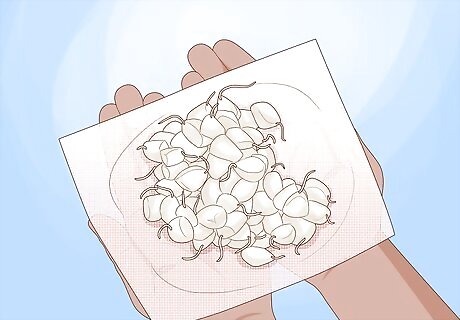
Buy a sprouted seedling for easier cultivation. If you live in a more temperate area, starting with a germinated plant may be your best bet. Ask your local plant nursery or garden center if they can source a cacao seedling for you. Once you receive the tree, all you’ll have to do is plant it and care for it until it begins fruiting. Ask for a "self-compatible" cacao plant. These don’t require pollination in order to produce fruit pods (which contain the seeds for making chocolate). Most seeds are “self-incompatible” and need to be pollinated from an unrelated tree. This will require you to have more than 1 tree within the same area. Starting with a seedling is often the promising approach, unless you’re an experienced gardener. A seedling will already be toughened for container growing, and is less likely to succumb to disease of climate-related complications.
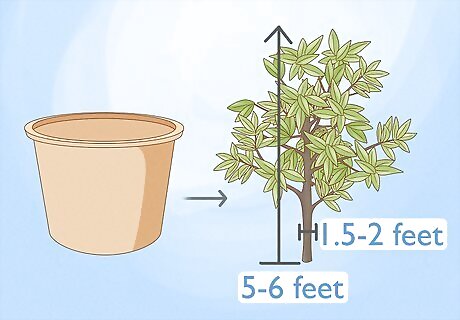
Pick out a spacious container. Find a container that’s large enough to allow the plant to spread out comfortably as it grows. If you’re raising the cacao from seed, a small standard pot will work just fine, as long as it’s deep enough for the roots to burrow down. If possible, have one or more larger containers on standby. Developing seedlings will need to be transplanted after about 4-5 months. Fully-grown trees can reach up to 5–6 feet (1.5–1.8 m) in height, with a trunk diameter of 1.5–2 feet (0.46–0.61 m).
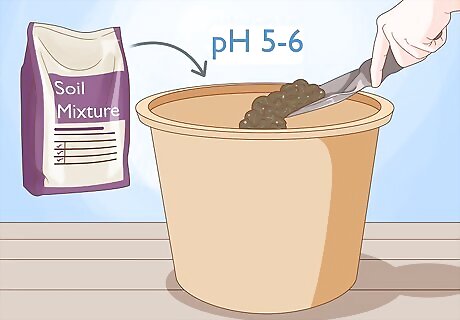
Fill your planting container with well-drained soil mixture. Any standard commercial potting soil will be acceptable. For best results, supplement your potting soil with a mixture of well-rotted compost and sand. This will create a rich, sandy base for the plant similar to what it’s used to in the wild. Fine types of mulch can also work well as an alternative to commercial potting soil. Cacao does best in a soil with a pH between 5 and 6.
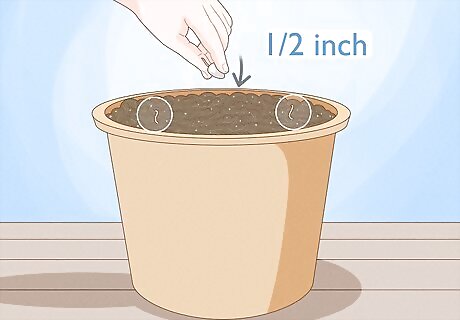
Plant the seeds or seedling in the pot. All that’s left to do now is transfer the cacao to your growing container. Press the germinated seeds ⁄2 inch (1.3 cm) into the soil, or make a depression deep enough to seat a young seedling. Then, fill in the loose soil and pat it lightly to hold the seeds or seedling in place. Chocolate trees need a little room to expand, so limit 2-3 seeds or 1 seedling per container, and be prepared to transplant the plants once they outgrow their original setting.
Growing Cacao Successfully
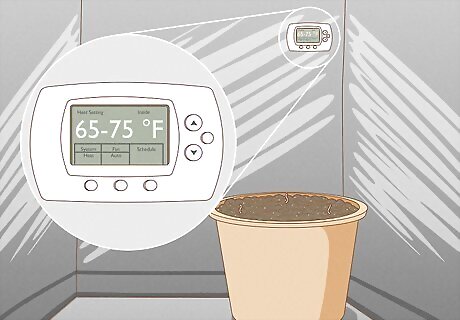
Find a warm spot to place your growing container. Ideally, you’ll be able to raise your cacao in a temperature-controlled greenhouse or growing room. If you’re cultivating your plant indoors where the temperature and humidity are lower, select a spot that tends to stay warm throughout the day, such as an open living room or screened-in porch in the summertime. Make sure the thermostat in your growing space stays set to 65–75 °F (18–24 °C) at all times. A nearby space heater should be fine, as long as it's not too close to the seedling.
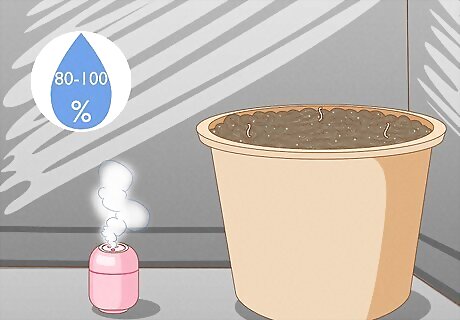
Create a humid environment for your plant. Placing a humidifier near your cacao seedling will help suffuse it with the moisture it needs to grow. If you don't have a humidifier, leave a bowl of water next to your plant so it can continually absorb a little humidity. Cacao does best in humidity levels 80% ~ 100%. Consider bringing your seedling into the bathroom with you when you shower. The humid air will simulate the steamy tropical environment where the plant naturally thrives. Dry air and soil are major threats to the health of a developing chocolate tree since they grow in the tropics where the climate is warm and moist.
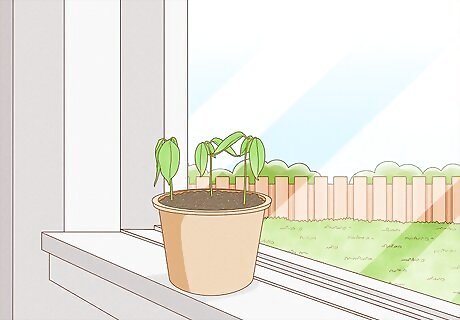
Position your plant where it can receive indirect sunlight. Set aside a suitable spot beside a taller plant or near the center of a room away from any open windows. In the wild, chocolate trees can usually be found beneath the shade of the rainforest canopy, which means filtered light is best for them. Young cacao trees will grow on a windowsill, but they will outgrow it. Keep them in dappled shade. Keep your cacao plant away from direct sunlight and intense heat sources, as these may cause it to dry out.
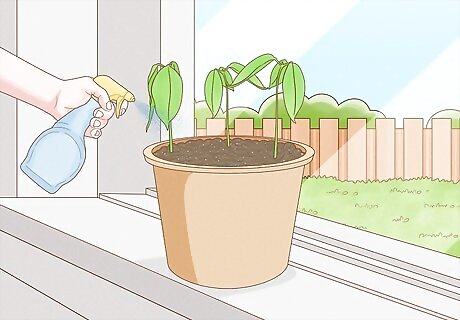
Wet your cacao plant periodically throughout the day. Because this plant evolved in a tropical region, it will do better with frequent spritzes than heavier watering. Moisten the leaves and upper surface of the soil thoroughly with a spray bottle, but avoid overwatering. Allow the soil to dry to the touch between sprays. When watering young seedlings, mist the underside of the leaves rather than the top. Pooling water can be too heavy for the leaves to withstand. Maintaining a humid environment above and below the roots is crucial, as dry air can quickly kill the plant. Use well-drained soil to prevent the roots from becoming oversaturated.
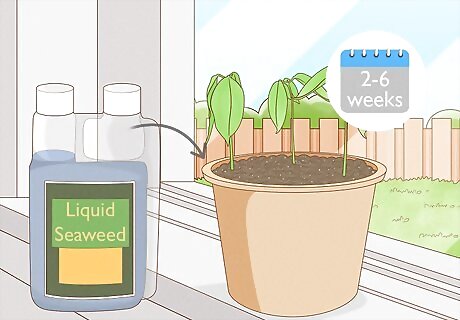
Fertilize growing plants every 2-6 weeks. Apply a general purpose water-soluble fertilizer once every couple of weeks, or spread a granular top dressing over the soil about once a month. You might also opt for a natural fertilizer such as liquid seaweed or fish emulsion to keep vital nutrients flowing to the plant. The best time to apply fertilizer is during the plant’s peak growing season, which lasts from mid-spring to early fall. Hold off on fertilizing sprouted seeds until the second set of leaves have appeared. Be careful not to overfeed your cacao plant. Doing so could burn the roots and stunt its growth.

Seek advice from other indoor chocolate growers. Search for firsthand accounts from people who have done a lot of experimenting with placement, humidity control, and other cultivation methods. Reading about their experiences can help you avoid common growing mistakes and improve your plant’s chances of survival the first time around. Many gardening websites allow registered members to ask questions in their forums. Someone experienced may spot your question and help you out.




















Comments
0 comment